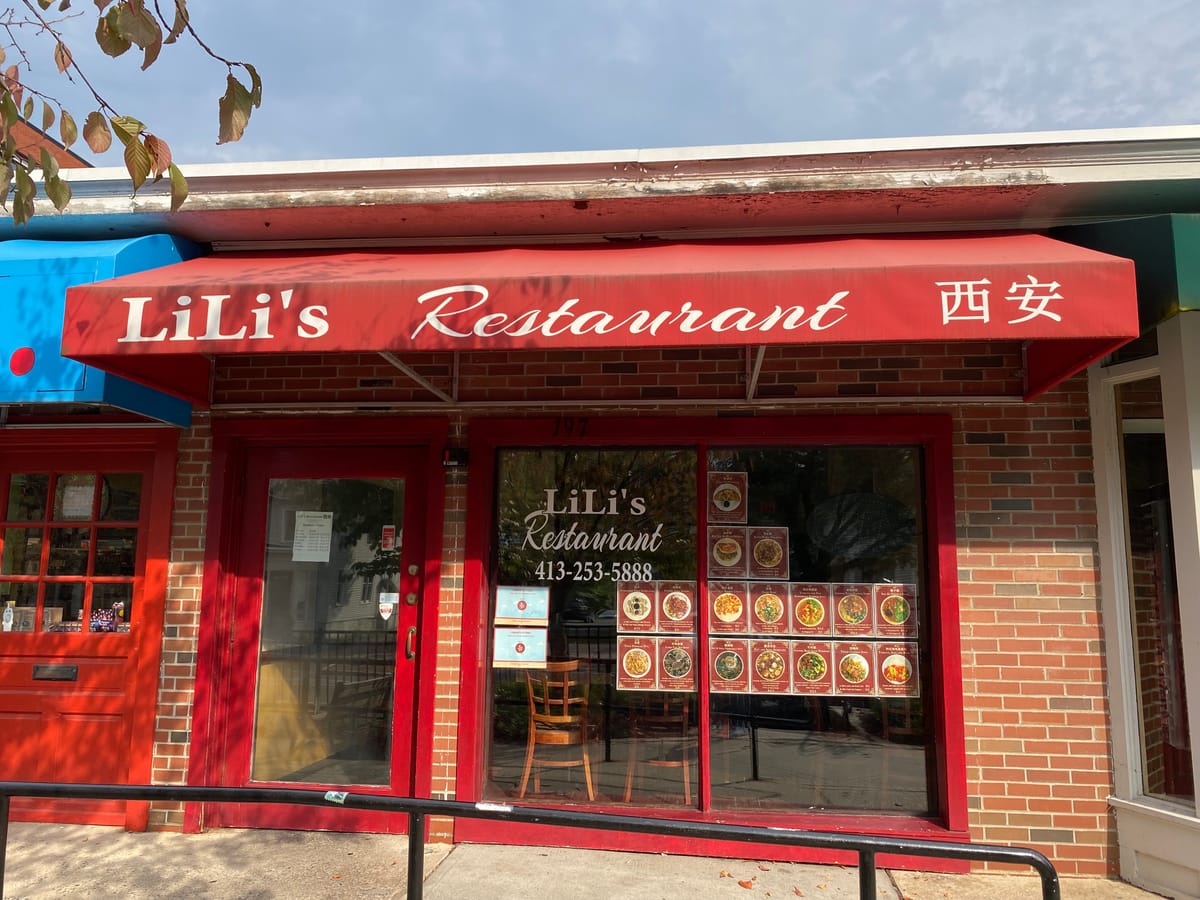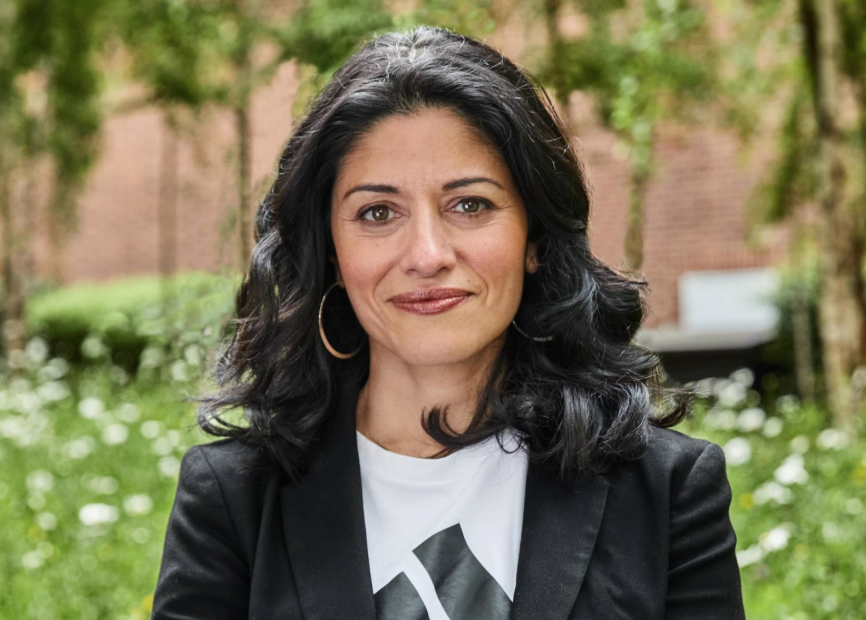Local Lookout: LiLi’s Restaurant
In this new series, The Student highlights the stories of the town of Amherst. For the first edition, The Student sat down with Li Jia, the owner of LiLi’s, a Xi’an Chinese restaurant on North Pleasant street.

LiLi’s Restaurant is a Xi’an Chinese restaurant on North Pleasant Street in the town of Amherst. The Student sat down with the owner of the restaurant, Li Jia, to hear about her experience running the place. The interview was conducted in Mandarin and translated afterward into English. The interview in the original Mandarin is also included below. Both versions have been edited lightly for clarity.
Q: How did you first start this restaurant?
A: I started this restaurant in January 2017. My child [was] off to college, and I didn’t have much to do, so I really wanted something that I could do myself at home every day. Because I am from Xi’an, and I think we have a lot of unique, delicious food in Xi’an, I wanted to bring some of the food that we used to make at home to this place, something different from American Chinese restaurants here. At that time, we also figured that we have a lot of local farms here with fresh vegetables that we can use, especially in the summer and fall. Now, in the summer, we rarely buy vegetables in stores and just buy them at local farms. I wanted to use this natural advantage, and make something delicious.
Q: Why did you choose Amherst to open this restaurant in the first place?
A: I’ve worked [in a restaurant] in the area for a long time, and after thinking about it for a while, I felt that the local people are more open in terms of food culture — they like to try new things. Like when we first started making Rou Jia Mo pork burgers, a lot of Americans didn’t really try it, perhaps thinking, ‘Why are Chinese restaurants making burgers?’ But after a lot of people tried it, they actually really liked it. Because I also have been here for a long time, I understand the food culture of the local people. People usually have a hard time accepting foreign things, but [here] they like to try new things … I just try to make some different things, so that everyone can try the authentic food culture of China.
Q: What does it mean to you to start a Xi’an restaurant in a place like the U.S.?
A: [I] think one of the things it solves is that sometimes I miss the food from my hometown — especially when celebrating Chinese New Years and other holidays, I really want to eat something from my hometown. The Chinese students here are the same. I’ve had people ask me before, ‘Auntie, do you know how to make this type of noodles?’ and [I would say,] ‘I'm really sorry, I don’t know how, I only know how to make lamb soup.’ [Opening this place] has helped a lot of students’ homesickness. Actually, at the start, I didn’t know how to make [the food] either, but after coming to the U.S. for so many years, I slowly just learned how to do it.
Q: I’m curious what kind of relationship you think your restaurant has built with the town, both students and residents? Do you have any stories?
A: Well, I worked at Formosa for a long time, so I know a lot of the locals. I know the customers who come often, and if a new face happens to come in, I ask about them and chat with them. There are students who come very often, and I know all their orders. [Some students] order without leaving a name or a number, but I can remember whose order is whose … Sometimes I run into some of the customers I see very often, and we say ‘hi’ to each other. As for stories … I’ve been here for a long time, and so one time a parent asked if I knew any Chinese teachers, and I sent a message in a group chat, and a ton of people sent in their resumes, which was just interesting. My son didn’t learn Chinese well [laughs]. I feel like this is also a kind of relationship that I’ve slowly built.
Q: How did you promote your restaurant in the beginning?
A: I never made advertisements for this place; it was all word of mouth at the beginning. And, let me tell you, the first day we opened, the first customer who came left as soon as he tried my food. Because I didn’t know how to cook in large portions at the time — I’d always just done home cooking — I didn’t have a grasp on seasoning.. But when the customer left, I felt very worried, so now every time I finish something, I taste it first and see how the seasoning is. Slowly, I figured out how to control the ingredients and seasoning and taste for cooking in large portions. Although this place is small, the reviews have been all very good, so there is a small sense of achievement.
Q: How did the pandemic affect your business?
A: I think the business actually seems to be better after the pandemic than before it, but recently prices have been going up quite a lot, so we’re trying to control the costs as much as we can. We closed our doors for two months during the pandemic, and after we closed, we felt that we could not keep them closed indefinitely, so then we opened again. Business was pretty bad when the pandemic first died down, but slowly, especially this year, with the students coming back to school, we are doing much better.
Q: 你最开始是怎么开始做这个餐馆的?
A: 我这个餐馆是从2017年一月份开始的,就是觉得孩子大了(我)在家好像没有什么事情,特别想做一件自己家里日常做的东西。因为我是西安人,我想我们西安那边食品做得很有特色,好吃的。我想把我们家里常做的一些面食带到这个地方来,就是跟其他美国中餐馆的要做些不同的东西。当时我们也想了想在我们当地有很多农场很多新鲜的蔬菜,尤其夏天和秋天时候,我们可以用上。现在夏天时我们很少在商店去买菜,都是在当地的farm去买菜。我想利用这个天然的这个优势,想做点好吃的。
Q: 那你最初为什么选择在Amherst做这个餐馆呢?
A: 因为我在当地也做(餐饮)了很长时间,我感觉反复考虑之后,这个地方当地人饮食文化比较open,喜欢尝试新的东西……比如说我们开始做肉夹馍的时候,很多美国人就不认可,心想你中国餐馆做什么burger。最后经过好多人尝试以后,他们真的非常喜欢。因为我也在当地很长时间,我了解这个当地的居民的饮食文化,这里的文化气息比较浓一些。大家一般很难接受外来的东西,但是(在这儿)他们喜欢尝试新鲜的东西……我就尝试做一些不同的东西,让大家尝试中国真正的那种饮食文化。
Q: 在美国这样一个地方做一个西安中餐馆,对你来说有什么意义?
A: (我)觉得一个是解决了我想念家乡那些食品啊,尤其有时候过年过节的时候,好想吃家乡的什么东西。这里的中国学生也一样。还有人问我,阿姨你会不会做这种面,我(说)实在对不起,我不会做,我会做羊肉泡馍。解决了现在好多学生的思乡。其实一开始我也不会做,但是来了美国这么多年,琢磨琢磨慢慢也就学会了。
Q: 我很好奇你觉得你们的餐馆和小镇,无论是学生还是居民,是什么样的关系?有没有什么故事?
A: 其实我之前在Formosa做了很多年,所以我认识很多居民。经常来的顾客我都认识,如果偶然来个新面孔,我会问问。我都知道(哪些)学生也是经常来的,我会知道他们的orders。并且有时候(有学生)叫外卖也不留名字电话号码,我能记住谁是谁的……有时候在街上看到一些经常见的客人,我们都会打招呼。故事的话……我在这儿很久了,然后有一次有家长问我认不认识教中文的老师,然后我在群里一问,就有很多人应聘,就很有意思。我儿子的中文就没学好(笑)。我觉得这也是一种慢慢建立的关系吧。
Q: 你一开始是怎么推广你们的餐馆的?
A: 这个地方我从来没有做广告,一开始都是大家口口相传,并且我跟你说,我做的第一天开门的时候,第一个顾客吃的就是当时一尝我那些东西就走了。我当时因为我没有做过那种大锅饭,从来都是做小锅,我掌握不住咸淡。但顾客走的时候,当时我就觉得很担心,所以每次我做完东西,我都要尝一下味道,然后味道怎么样,慢慢我就掌握了这种大锅饭的这种那个料呀,咸淡呀,还有味道,我都摸索出来的。虽然说地方很小,但是评价都很好,有一点小成就感吧。
Q: 新冠疫情怎么影响到你的生意?
A: 我觉得生意疫情后比疫情前好像反而好一些,但是最近物价都在涨的挺大,所以我们尽量控制成本。疫情期间我们关了两个月的门,关门之后感觉一直关着不行,然后就又开门了。疫情刚结束时候还不行,生意很淡,但是慢慢,尤其到今年,学生开学之后,觉得好很多。





Comments ()